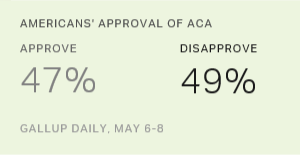Story Highlights
- 49% in U.S. disapprove of ACA; 47% approve
- 22% say the law has helped their families; 26% say it has hurt
- Americans roughly divided about long-term effects on nation
WASHINGTON, D.C. -- Six years after its passage, Americans are almost evenly divided about the Affordable Care Act (ACA). Forty-nine percent say they disapprove of the act, while 47% approve of President Barack Obama's signature achievement. Approval is tied at its highest level since 2012.
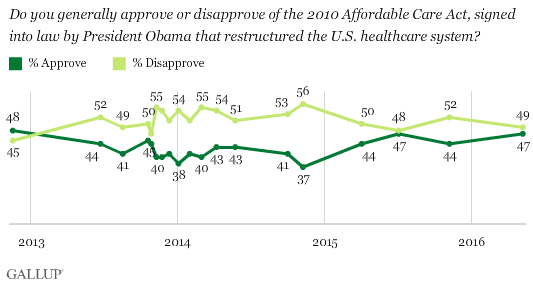
Americans' opinions of the ACA have fluctuated over the past four years. Just after Obama's reelection in November 2012, slightly more Americans (48%) said they approved of the law than disapproved (45%). Since then, more Americans have expressed disapproval in subsequent Gallup surveys. However, in several of these, including the latest May 6-8 survey, the gap between approval and disapproval is within the margin of error. The highest level of Americans' disapproval with the ACA (56%) was in November 2014, right after the election in which the Democrats lost the Senate.
More Americans Saying the ACA Helping Their Families
Slowly but steadily, the percentage of Americans who say Obamacare has helped them and their families has risen and, at 22%, is now at its highest since 2012. The percentage who say the law has hurt them is up 10 percentage points, now at 26%. The bulk of Americans continue to say the law has "had no effect," and that percentage is down significantly, from 70% in 2012 to 50% today. As the law is almost completely implemented nationwide, the financial effects of the ACA, along with the emotional effects it has either provided or not provided, are likely sinking in. The number of uninsured Americans has declined under Obamacare, though the law continues to be a hot point of contention in American life.
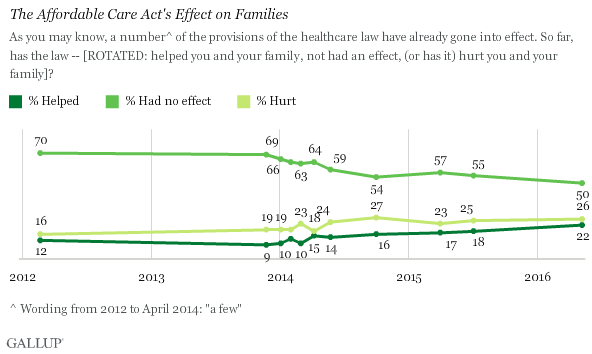
The percentage of those who say the law has "had no effect" may be attributable to Obamacare not directly affecting them, including those on Medicare or those who have employer insurance.
Long Term, Americans Mixed on Effects
Americans continue to have mixed views on the ACA's long-term effects on themselves and their families. Overall, Americans are roughly divided among the beliefs that the ACA, in the long run, will make their healthcare situation better (26%), make it worse (33%) or not make much difference (39%). This three-way split is similar to what it was when Gallup first asked this question four years ago. The percentage who say ACA will improve their healthcare over time is up slightly from recent years and, by one point, is the highest measured. The percentage who say their healthcare situation will be worse is down from 38% in 2012.
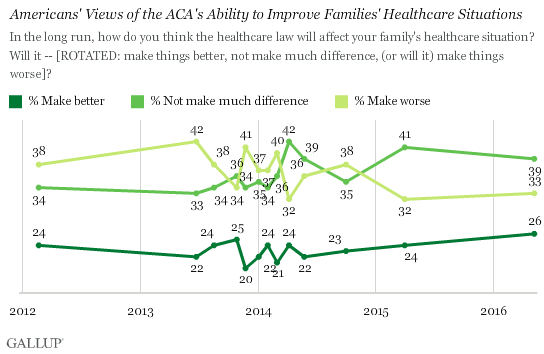
Americans are also divided on their views of the long-term effect of the law on the U.S. healthcare system. U.S. adults have consistently been more likely to say the law would make things worse rather than better over the past three years, but the gap has narrowed significantly.
In June 2013, 34% said the law would make healthcare nationwide better, and 47% said it would make things worse. Now, 40% say the nation's healthcare situation will be better in the long run, and 41% say it will be worse. Contrary to the sizable percentage of those who say the law hasn't personally affected them, a much smaller percentage (16%) say the ACA will not make much difference on healthcare in the U.S.
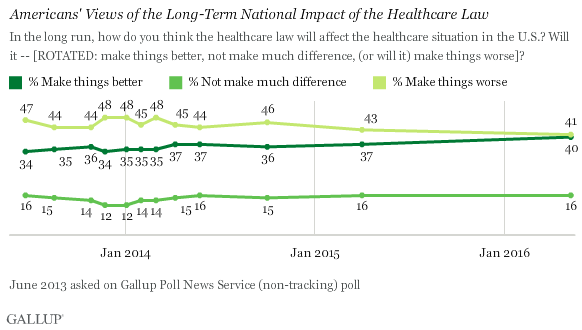
In this survey, Gallup asked Americans for the first time about the effect of the law so far in the U.S. Again, there is a split. Forty percent say the law has hurt the healthcare situation in the U.S., and 39% say it has helped. A much smaller percentage (14%) say it has had no effect.
Bottom Line
Americans are divided about whether they approve or disapprove of the Affordable Care Act, but support for the law has edged up from its lows in 2014. After the disastrous rollout of the U.S. government's website, along with the mass cancellation of healthcare policies in late 2013, Americans are slowly warming up to the law, its effects on themselves and their families, and the effect it will have long term for healthcare in the U.S. Support is nearly back to what it was in late 2012, a time, like now, when the president enjoyed majority job approval.
As they have been since the law's inception, views of the ACA are divided along party lines, with Democrats strongly positive and Republicans strongly negative. These attitudes on the part of rank-and-file partisans are carried over by the party's presumed nominees. While Donald Trump has vowed to repeal Obamacare immediately after taking office, it is clear that a significant portion of the public would denounce such a move. If Hillary Clinton becomes the Democratic nominee and eventually president, the Affordable Care Act will remain intact, at least for the short term. That may allow trends of greater acceptance of the healthcare law to continue into a Clinton presidency. On the other hand, if Republicans continue to be negative about the Affordable Care Act, divided approval and disapproval may continue as the norm, even if it remains the law.
Historical data are available in Gallup Analytics.
Survey Methods
Results for this Gallup poll are based on telephone interviews conducted May 6-8, 2016, on the Gallup U.S. Daily survey, with a random sample of 1,549 adults, aged 18 and older, living in all 50 U.S. states and the District of Columbia. For results based on the total sample of national adults, the margin of sampling error is ±3 percentage points at the 95% confidence level. All reported margins of sampling error include computed design effects for weighting.
Each sample of national adults includes a minimum quota of 60% cellphone respondents and 40% landline respondents, with additional minimum quotas by time zone within region. Landline and cellular telephone numbers are selected using random-digit-dial methods.
Learn more about how Gallup Daily tracking works.
View survey methodology, complete question responses and trends.
